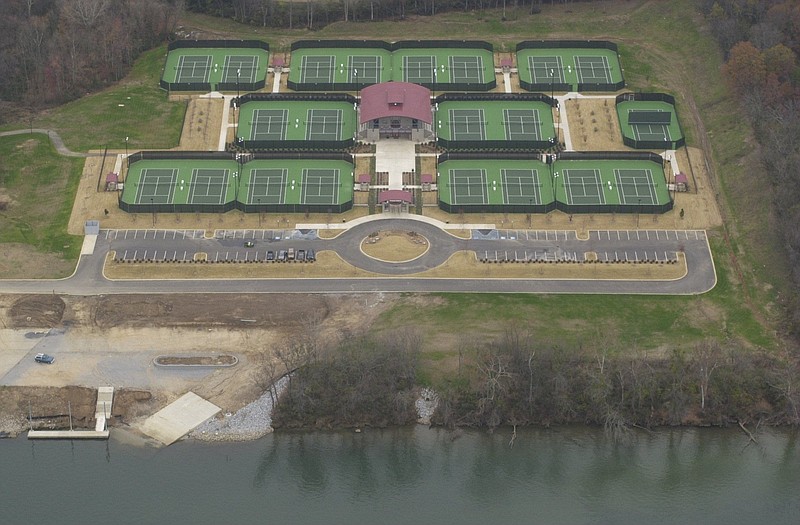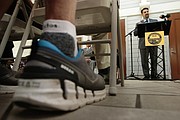 Bob Doak, president and CEO of the Chattanooga Convention and Visitors Bureau, speaks on Wedesday, Apr. 20, 2016, in Chattanooga, Tenn., before Guido Bauer of Green Globe announces that Ruby Falls will receive the Green Globe Sustainability Award in September. The announcement ceremony was held at the Lookout Mountain attraction.
Bob Doak, president and CEO of the Chattanooga Convention and Visitors Bureau, speaks on Wedesday, Apr. 20, 2016, in Chattanooga, Tenn., before Guido Bauer of Green Globe announces that Ruby Falls will receive the Green Globe Sustainability Award in September. The announcement ceremony was held at the Lookout Mountain attraction. The NCAA also announced the relocation of five other events after pulling seven championships from North Carolina last month:
- The Division I women's soccer championship to San Jose, Calif. - The Division III men's and women's soccer championships to Salem, Va. - The Division I women's golf regional championships to Athens, Ga. - The Division I women's lacrosse championship to Boston. - The Division II baseball championship to Grand Prairie, Texas.
Chattanooga will host the 2017 Division III men's and women's tennis championships next May, after the NCAA pulled the event from North Carolina because of the state's law restricting the rights of LGBT people.
The NCAA pulled the tennis championships and other events from North Carolina in September in response to the law known as HB2, which excludes gender identity and sexual orientation from local and statewide anti-discrimination protections. It also requires transgender people to use restrooms at schools and government buildings corresponding to the sex on their birth certificates.
The championships will now take place May 22-27 at the Champions Club Tennis Complex at Rivermont Park, 3400 Lupton Drive, after Chattanooga submitted a winning bid to host the event, the city's first NCAA championship since 2009, according to the Chattanooga Sports Committee.
The city had already submitted a bid to host the NCAA Division I championships at the Champions Club, and officials made the decision to add a bid for the Division III championships after the league chose not to host the event in North Carolina, officials said.
"When the opportunity presented itself because of the decision NCAA made, we saw it as getting us back into the NCAA championships world, because that's the ultimate," said Bob Doak, president and CEO of the Chattanooga Convention and Visitors Bureau.
Though the Scenic City has won recognition for its Bible-mindedness, and regularly plays host to a number of religious events, Chattanooga's social fabric has never been an issue, pro or con, when working to attract major events, Doak said. Instead, event organizers look for tangible criteria like the number of volunteers - the Ironman alone attracted 4,000 volunteers - as well as the number of hotel rooms, restaurants, attractions and the sports facilities themselves, he said.
Beyond facilities and volunteers, Chattanooga is helped by its location at a major interstate crossroads that enables 60 percent of the U.S. population to reach it within a day's drive, Doak said. Moreover, Chattanooga's stature in the sports world has been greatly amplified through its hosting of the Ironman. It's the only city in the world to host four Ironman events in one year, including a championship.
"People pay attention to everything you host," said Tim Morgan, president of the Chattanooga Sports Committee. "Whether it's a track and field championship or a youth soccer tournament, national governing bodies pay attention to who is hosting it and how they're hosting it. Once we do it right and when we are successful, other opportunities will present themselves down the road."
Those opportunities, especially the big ones, pay large dividends, according to tourism officials.
When the city's five-year deal with the Ironman concludes, the partnership will have yielded about $100 million for Chattanooga, Doak said.
The Chattanooga Sports Committee, University of the South, and the Champions Tennis Club teamed up to help secure the winning bid for the NCAA tennis championships, according to a news release.
The move to relocate the tennis championships from North Carolina is only part of the public and business backlash against recent legislation in the state. Days after the NCAA removed events from North Carolina, the Atlantic Coast Conference pulled its football championship game from Charlotte and has since moved it to Orlando. It's among several ACC relocated events.
The NBA moved its 2017 All-Star Game from Charlotte to New Orleans. Entertainers Bruce Springsteen, Pearl Jam and Ringo Starr have canceled plans to play in North Carolina. PayPal reversed plans to open a 400-employee operation center in Charlotte.
Charlotte had passed a local anti-discrimination ordinance for LGBT people. In response, the North Carolina legislature approved the current statewide law in March, which overrides local ordinances that ban discrimination.
Beyond tennis, the NCAA relocated several other sports from Greensboro, N.C., in response to state laws.
The NCAA's men's basketball regional tournament was relocated to Greenville, S.C., where the first and second rounds of the men's tournament will be played at the Bon Secours Wellness Arena.
The men's basketball games, set for March 17 and 19, will be the first time the venue in Greenville has hosted the NCAA men's tournament since 2002. That was the final NCAA event held in South Carolina after the organization banned the awarding of neutral-site tournaments to the state for flying the Confederate flag on statehouse grounds.
That ban ended in July 2015 when the state took down the flag after nine parishioners were gunned down at a Charleston church.
The Associated Press contributed to this story.

